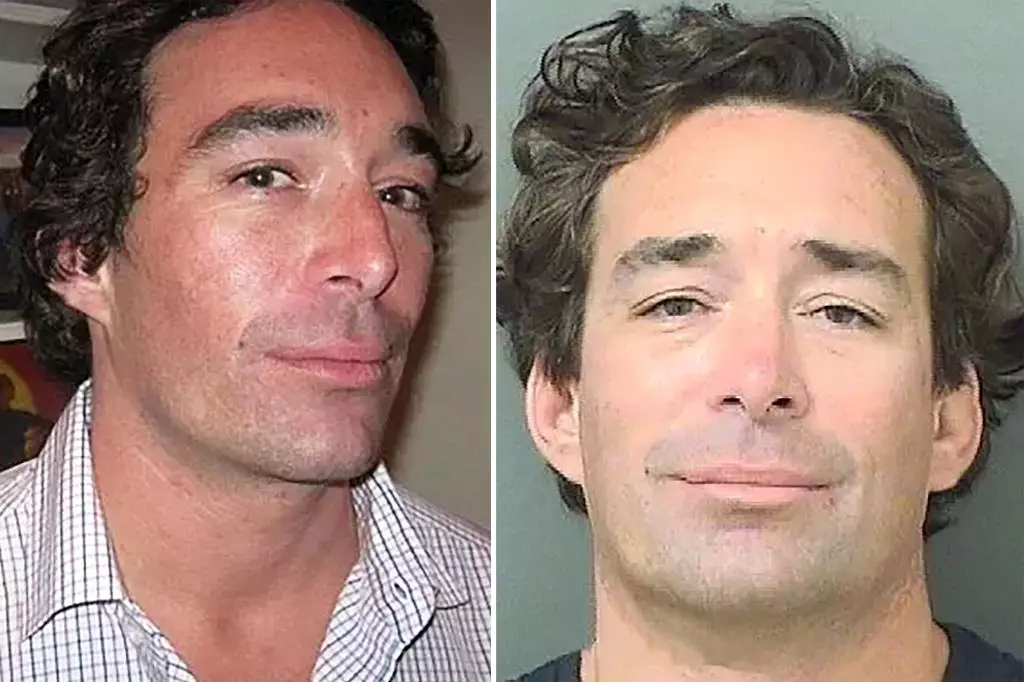In a surprising turn of events, Alexander “Nico” Fanjul, a high-profile figure rooted in wealth and privilege, has admitted guilt to several heinous charges, including felony battery. The fallout from a disturbing domestic violence incident at his opulent Palm Beach residence has left the public questioning the moral compass of this sugar heir. The recent court ruling imposes a four-year probationary sentence alongside 200 hours of mandated community service, effectively marking a dark chapter in his family’s storied legacy in the sugar and real estate industries.
Fanjul’s fall from grace began during a routine dinner at the upscale Flagler Steakhouse, where a seemingly innocuous outing spiraled into a scene of violence. The evening took a shocking turn; an argument ignited by the couple’s seating arrangement beside a same-sex couple culminated in a reported domestic assault. As police arrived, the unsettling tableau of a frightened woman in a fetal position and a bloodied face painted a harrowing picture. This incident has raised significant concerns regarding not only Fanjul’s behavior but also the broader implications of such actions within affluent circles.
This alarming incident is not isolated in Fanjul’s history. Reports reveal a troubling pattern of behavior marked by violence towards women, which has struck a chord of fear and concern among those close to him. Just months after his initial charges, law enforcement was summoned once again due to claims from another girlfriend, who described a chilling encounter where Fanjul allegedly tackled her to the ground during a moment of conflict. The woman asserted that her relationship with Fanjul was marred by unreported physical violence, underscoring a troubling trend of abusive behavior.
These troubling allegations echo previous claims made by Tinsley Mortimer, a former girlfriend and socialite once associated with the “Real Housewives of New York.” Mortimer’s accusations, ranging from physical assaults to emotional torment, suggest a disturbing thread that weaves through Fanjul’s relationships. Although Mortimer’s claims garnered media attention, they ultimately led to a lack of concrete legal repercussions, leaving a question mark over Fanjul’s accountability.
The Response from Power and Influence
Despite the severity of the situation, Nico Fanjul has managed to maintain a level of influence and favor among his affluent peers. Following his arrest, he was sent to a luxury rehabilitation center, a move seemingly marked by privilege rather than true accountability. His family, the Fanjuls, who control Florida Crystals and other significant ventures, issued statements emphasizing their son’s intent to improve and contribute positively to the community. Such assurances raise eyebrows and questions, particularly about the nature of justice afforded to individuals born into power and wealth.
The disparity between the legal consequences faced by someone like Fanjul and those encountered by individuals from less privileged backgrounds highlights a significant societal issue. As the legal system affords some protection and leniency to the affluent, it raises essential questions about equality and justice in cases of domestic violence. Fanjul’s community service and probation seem inadequate compared to the emotional and physical harm inflicted upon his victims.
The saga of Alexander Fanjul acts as a mirror reflecting systemic issues prevalent in society—especially regarding the treatment of domestic violence cases. As Fanjul navigates probation and community service, one must ponder the broader implications of privilege and power. Will his circumstances genuinely lead to rehabilitation, or will they merely reinforce the portents of wealth insulating individuals from the consequences of their actions?
As we witness the unfolding of Fanjul’s narrative, it serves as a crucial reminder that accountability should transcend social class. The victims of such domestic violence deserve validation, support, and a justice system that prioritizes their protection over the interests of the privileged.
In a world where wealth often dictates the narrative, it is imperative for society to remain vigilant, ensuring that those in power are held accountable for their actions. Only then can we hope to foster an environment where respect, safety, and equality reign, overshadowing the dark shadows of violence that continue to plague many lives.
